Man seeks redemption after losing CPA license
July 26, 2024 | California Board of Accountancy, Other State Agencies, Executive, California

This article was created by AI summarizing key points discussed. AI makes mistakes, so for full details and context, please refer to the video of the full meeting. Please report any errors so we can fix them. Report an error »

In a recent government meeting, Larry Harmon, a former CPA, addressed the board regarding his petition for reinstatement of his accounting license, which he surrendered following a criminal conviction in 2010. Harmon, who has since relocated to Bozeman, Montana, expressed a desire to reclaim the title of \"CPA retired,\" emphasizing that this designation holds significant personal value for him.
During his testimony, Harmon detailed his extensive career in accounting, which began in 1988 at Touche Ross, later merging with Deloitte. He highlighted his expertise in state and local tax consulting and his role in significant tax cases, including a notable victory regarding apportionment methodology in California. However, he acknowledged that his career took a downturn due to his involvement in submitting false refund claims for a fictitious company, an act he attributed to coercion and poor judgment.
Harmon stated that he has not practiced accounting since surrendering his license but has engaged in consulting and philanthropic efforts, particularly in the CBD industry, which he credits with helping his mother during her battle with Parkinson's disease. He described his current work as largely informal, assisting family and friends without charging fees.
The board raised concerns about Harmon’s continuing education efforts, noting that he completed 120 hours of online courses in a short period, which some members questioned for its ethical implications. Harmon defended his approach, asserting that the courses were legitimate and state-approved, and he expressed confidence in his ability to meet any future educational requirements.
Throughout the meeting, Harmon emphasized his commitment to ethical standards and his desire for a second chance, stating, \"This is about a second chance that a lot of people don't get in life.\" He expressed gratitude for the opportunity to present his case and reiterated that regardless of the board's decision, he would accept it with humility.
The board's deliberation on Harmon’s petition reflects broader themes of rehabilitation and accountability within the professional accounting community, as they weigh the implications of reinstating a license for someone with a troubled past.
During his testimony, Harmon detailed his extensive career in accounting, which began in 1988 at Touche Ross, later merging with Deloitte. He highlighted his expertise in state and local tax consulting and his role in significant tax cases, including a notable victory regarding apportionment methodology in California. However, he acknowledged that his career took a downturn due to his involvement in submitting false refund claims for a fictitious company, an act he attributed to coercion and poor judgment.
Harmon stated that he has not practiced accounting since surrendering his license but has engaged in consulting and philanthropic efforts, particularly in the CBD industry, which he credits with helping his mother during her battle with Parkinson's disease. He described his current work as largely informal, assisting family and friends without charging fees.
The board raised concerns about Harmon’s continuing education efforts, noting that he completed 120 hours of online courses in a short period, which some members questioned for its ethical implications. Harmon defended his approach, asserting that the courses were legitimate and state-approved, and he expressed confidence in his ability to meet any future educational requirements.
Throughout the meeting, Harmon emphasized his commitment to ethical standards and his desire for a second chance, stating, \"This is about a second chance that a lot of people don't get in life.\" He expressed gratitude for the opportunity to present his case and reiterated that regardless of the board's decision, he would accept it with humility.
The board's deliberation on Harmon’s petition reflects broader themes of rehabilitation and accountability within the professional accounting community, as they weigh the implications of reinstating a license for someone with a troubled past.
View full meeting
This article is based on a recent meeting—watch the full video and explore the complete transcript for deeper insights into the discussion.
View full meeting
